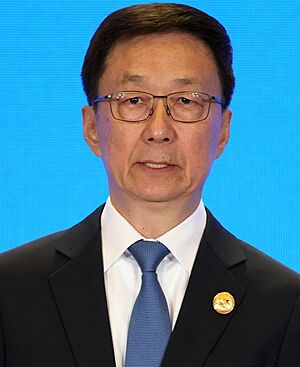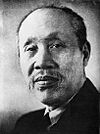Vice President of China facts for kids
Quick facts for kids Vice President of thePeople's Republic of China |
|
|---|---|

|
|
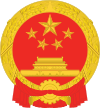
National Emblem of China
|
|
| Style | Mr. Vice President (副主席) (informal) His Excellency (阁下) (diplomatic) |
| Residence | Zhongnanhai |
| Seat | Zhongnanhai West Building, Beijing |
| Nominator | Presidium of the National People's Congress |
| Appointer | National People's Congress |
| Term length | Five years, renewable |
| Constituting instrument | Constitution of China |
| Inaugural holder | Li Yuanhong (Republican era) Zhu De (current form) |
| Formation | 1 January 1912 (Republican era) 27 September 1954 (current form) |
| Abolished | Between 1975 and 1982 |
| Vice President of China | |||||||
|---|---|---|---|---|---|---|---|
| Simplified Chinese | 中华人民共和国副主席 | ||||||
|
|||||||
| Alternative Chinese name | |||||||
| Simplified Chinese | 国家副主席 | ||||||
|
|||||||
The Vice President of China is officially called the Vice President of the People's Republic of China. This person is like the assistant to the President of the People's Republic of China. The President is the main representative of China.
The Vice President's job is mostly ceremonial. This means they attend events and represent the country. They don't usually make big political decisions.
The first Vice President in China's history was Li Yuanhong in 1912. The job as it is today started in 1954. Back then, it was called "state vice chairman." This role was removed in 1975 but brought back in 1982. Since 1982, the official English name has been "vice president."
The Vice President serves for five years. Until 2018, they could only serve two terms. But this limit was removed. The main duty of the Vice President is to help the President. If the President's job becomes empty, the Vice President takes over until a new President is chosen.
The current Vice President of China is Han Zheng. He started his job on March 10, 2023.
Contents
How the Vice President's Job Started
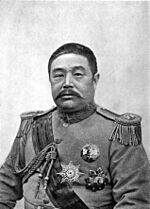
The role of Vice President first began in 1912. This was when the Republic of China was founded. Li Yuanhong was the very first person to hold this position. The job was stopped in 1917.
It was brought back later, in 1947. After 1949, the government of the Republic of China moved to Taiwan. The Vice President's office still exists there today.
The current Vice President job in the People's Republic of China started in 1954. It was first called "state vice chairman." This role, along with the chairman (president), was removed in 1975.
The job was then restored in 1982. It was renamed "vice president." The new rules in 1982 said the Vice President could only serve two terms. But in March 2018, this term limit was removed. This change was approved by the National People's Congress.
How a Vice President Is Chosen
Who Can Be Vice President?
To become Vice President, a person must meet three main rules:
- They must be a Chinese citizen.
- They must have the right to vote and be elected.
- They must be at least 45 years old.
The Election Process
The Vice President is chosen by the National People's Congress (NPC). The NPC is China's highest government body. The group that leads the NPC, called the Presidium, suggests who should be Vice President.
However, the choice is usually made by the Chinese Communist Party leaders. Even though the Presidium could suggest more than one person, they always suggest only one candidate.
After being suggested, the Vice President is elected by the NPC. The NPC also has the power to remove the Vice President from office. Elections and removals are decided by a majority vote. The Vice President serves for five years, just like the NPC. Since 2018, the Vice President must take an oath before starting their job.
What the Vice President Does
The Vice President's main job is to help the President. They can also take on some of the President's duties. If the President's job becomes empty, the Vice President steps in. They serve as President until the NPC elects a new one. If the Vice President's job becomes empty, the NPC elects a new Vice President.
In reality, the Vice President's role is mostly ceremonial. However, some Vice Presidents have been very important. For example, Hu Jintao, Zeng Qinghong, and Xi Jinping were all Vice Presidents. They were also members of the Politburo Standing Committee of the Chinese Communist Party. This is a very powerful group that makes big decisions in China.
The Vice President often plays a key role in foreign affairs. They might attend important meetings with leaders from other countries. They also usually help with policies related to Hong Kong and Macau. So, even if the job is mostly ceremonial, it is still a very important and respected position. People who hold this job usually have a lot of political influence.
List of Vice Presidents
- Leadership Eras
First Era Second Era Third Era Hu–Wen Administration Xi–Li Administration/General secretaryship of Xi Jinping
Early Leaders (1949–1954)
These individuals served as Vice Chairmen of the Central People's Government. They held the position together from October 1, 1949, to September 27, 1954.
- Zhu De
- Liu Shaoqi
- Song Qingling
- Li Jishen
- Zhang Lan
- Gao Gang (until his death in August 1954)
Vice Chairmen (1954–1975)
| Picture | Name (Born–Died) |
Time in Office | NPC | Chairman | |||
|---|---|---|---|---|---|---|---|
| 1 | 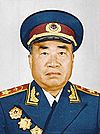 |
Zhu De 朱德 (1886–1976) |
September 27 1954 | April 27 1959 | I | Mao Zedong | |
| He was the first Vice Chairman of the People's Republic of China. | |||||||
| 2 | 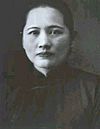
|
Song Qingling 宋庆龄 (1893–1981) |
Dong Biwu 董必武 (1886–1975) |
April 27 1959 | January 17 1975 | II · III | Liu Shaoqi |
| They served together as Vice Chairmen. | |||||||
| The job was empty and then removed. | |||||||
Vice Presidents (1982–Present)
| Picture | Name (Born–Died) |
Time in Office | NPC | President | ||
|---|---|---|---|---|---|---|
| 3 | 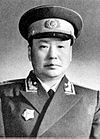 |
Ulanhu 乌兰夫 (1906–1988) |
June 18 1983 | April 8 1988 | VI | Li Xiannian |
| Ulanhu was the first Vice President under the 1982 Constitution. | ||||||
| 4 | 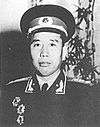 |
Wang Zhen 王震 (1908–1993) |
April 8 1988 | March 12 1993 | VII | Yang Shangkun |
| Wang Zhen was a military leader. He became Vice President in an honorary role. He died while in office. | ||||||
| 5 | 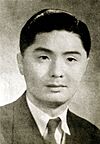 |
Rong Yiren 荣毅仁 (1916–2005) |
March 12 1993 | March 15 1998 | VIII | Jiang Zemin |
| Rong Yiren was a member of a non-Communist political party in China. | ||||||
| 6 | 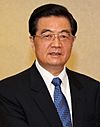 |
Hu Jintao 胡锦涛 (born 1942) |
March 15 1998 | March 15 2003 | IX | Jiang Zemin |
| Hu Jintao was the first Vice President since 1982 to also be a member of the powerful Politburo Standing Committee. He later became President. | ||||||
| 7 | 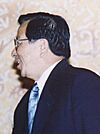 |
Zeng Qinghong 曾庆红 (born 1939) |
March 15 2003 | March 15 2008 | X | Hu Jintao |
| Zeng Qinghong was also a member of the Politburo Standing Committee. | ||||||
| 8 | 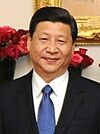 |
Xi Jinping 习近平 (born 1953) |
March 15 2008 | March 14 2013 | XI | Hu Jintao |
| Xi Jinping was the second Vice President to later become President. He was also a member of the Politburo Standing Committee. | ||||||
| 9 | 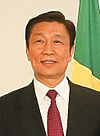 |
Li Yuanchao 李源潮 (born 1950) |
March 14 2013 | March 17 2018 | XII | Xi Jinping |
| Li Yuanchao represented China at many important international events. | ||||||
| 10 | 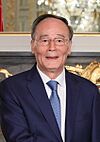 |
Wang Qishan 王岐山 (born 1948) |
March 17 2018 | March 10 2023 | XIII | Xi Jinping |
| Wang Qishan was chosen for his experience in foreign affairs. His role made the Vice Presidency very important again. | ||||||
| 11 | 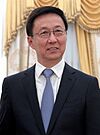 |
Han Zheng 韩正 (born 1954) |
March 10 2023 | Incumbent | XIV | Xi Jinping |
| Han Zheng was chosen for the Vice President job after being a top Vice-Premier. | ||||||
See also
 In Spanish: Vicepresidente de la República Popular China para niños
In Spanish: Vicepresidente de la República Popular China para niños
- Order of precedence in China
- Abolition of the presidency in China
- List of current vice presidents and designated acting presidents
 | Kyle Baker |
 | Joseph Yoakum |
 | Laura Wheeler Waring |
 | Henry Ossawa Tanner |


